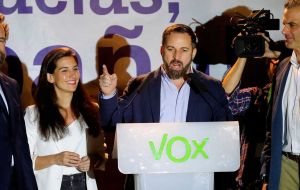MercoPress. South Atlantic News Agency
Socialists win the most votes in Spain but now must try and work a coalition
 Sanchez, whose party won the most votes but no parliamentary majority, told supporters he would put up no “safety cordon” in talks to form a government
Sanchez, whose party won the most votes but no parliamentary majority, told supporters he would put up no “safety cordon” in talks to form a government  In one of the country’s most hotly contested elections in decades, the rise of nationalist party Vox split the right-wing vote
In one of the country’s most hotly contested elections in decades, the rise of nationalist party Vox split the right-wing voteSpain’s Socialist leader Pedro Sanchez, fresh from a win for his party in national elections on Sunday, said the only conditions he would place on forming a coalition government would be respecting the constitution and promoting social justice.
Sanchez, whose party won the most votes but no parliamentary majority, told supporters he would put up no “safety cordon” in talks to form a government, a common expression used in the campaign to show one party refused to make a deal with another.
In one of the country’s most hotly contested elections in decades, the rise of nationalist party Vox split the right-wing vote, echoing fragmented parliaments across Europe where traditional groups have ceded to anti-establishment upstarts.
Spaniards cast their votes in numbers close to record highs with campaigning dominated by national identity and cultural values like women’s rights rather than the economy.
This is the third national election in four years, after the first two eroded the decades-long dominance of the two biggest parties, the Socialists and the conservative Popular Party.
Neither the rightist or the leftist political bloc held a clear majority, according to a tally of results from the Interior Ministry, with 80 per cent of votes counted.
By party, Sanchez’s Socialists led with 123 seats in the 350-seat parliament. The mainstream conservative People’s Party (PP) stood at 65 seats, centre-right Ciudadanos (‘Citizens’) at 57 seats, far-left Unidas Podemos at 42 and far-right Vox at 24.
Supporters gathered outside the Socialist headquarters in Madrid chanting ‘Long live Spain’ and ‘Long live Socialism’.
There was speculation before the election about a possible coalition between the Socialists and Ciudadanos despite both parties’ leaders ruling out any tie-up. If they were to forge an alliance, their parliamentary majority would mean that Sanchez would not have to seek the support of regional parties favoring Catalan independence.
However he would face a large bloc of right-wing lawmakers.
“Vox is without a doubt one of the big winners of the night,” said Narciso Michavila, the head of GAD3 pollsters, as the group’s success looked set to hand the far-right a sizeable presence in parliament for the first time since the end of Francisco Franco’s dictatorship of the 1970s.
The party, fierce opponents of the Catalan independence movement, had campaigned as guardians of Spanish history, customs and its survival as a nation.
Hundreds of people gathered outside Vox headquarters in Madrid for the vote count, waving Spanish flags and cheering. In Spain, issues like mass immigration or euro-skepticism that have dominated political discourse elsewhere have been eclipsed by the question of national unity and the threat posed by the Catalan independence movement.
The economy, one of the euro zone’s star performers, took a back seat in campaigning across the political parties.
Spain had long been seen as resistant to the wave of populist nationalism spreading across much of Europe with many older voters remembering the military dictatorship of Franco that ended after his death in 1975.




Top Comments
Disclaimer & comment rulesCommenting for this story is now closed.
If you have a Facebook account, become a fan and comment on our Facebook Page!